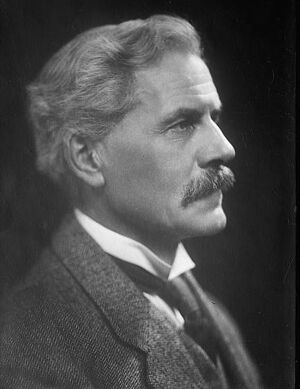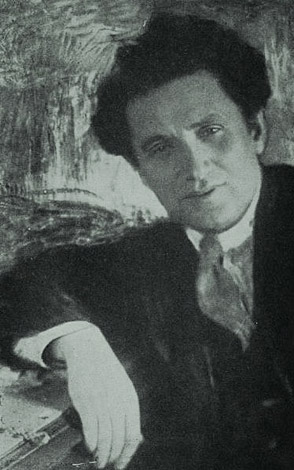Difference between revisions of "Zinoviev Letter"
(general update of important case) |
m |
||
| (One intermediate revision by one other user not shown) | |||
| Line 7: | Line 7: | ||
|description=MI5 fake letter published in the Daily Mail to destroy the 1924 Labour government | |description=MI5 fake letter published in the Daily Mail to destroy the 1924 Labour government | ||
|image=Russian revolt.jpg | |image=Russian revolt.jpg | ||
| − | |constitutes=propaganda | + | |constitutes=Black propaganda |
|perpetrators=Desmond Morton,George Ball, Winston Churchill? | |perpetrators=Desmond Morton,George Ball, Winston Churchill? | ||
}} | }} | ||
| Line 16: | Line 16: | ||
[[Robin Cook]], the Foreign Secretary in the Labour government elected in [[1997]] commissioned [[Gill Bennett]], chief historian at the [[Foreign Office]], to investigate the case of the Zinoviev Letter. Bennett reported that the letter was forged by a [[MI6]] agent's source and almost certainly leaked by [[MI6]] or [[MI5]] officers to the Conservative Party: "It points the finger at [[Desmond Morton]], an [[MI6]] officer and close friend of [[Winston Churchill|Churchill]] who appointed him personal assistant during the second world war, and at Major Joseph Ball, an MI5 officer who joined Conservative Central Office in 1926."<ref>https://www.theguardian.com/politics/1999/feb/04/uk.politicalnews6</ref> | [[Robin Cook]], the Foreign Secretary in the Labour government elected in [[1997]] commissioned [[Gill Bennett]], chief historian at the [[Foreign Office]], to investigate the case of the Zinoviev Letter. Bennett reported that the letter was forged by a [[MI6]] agent's source and almost certainly leaked by [[MI6]] or [[MI5]] officers to the Conservative Party: "It points the finger at [[Desmond Morton]], an [[MI6]] officer and close friend of [[Winston Churchill|Churchill]] who appointed him personal assistant during the second world war, and at Major Joseph Ball, an MI5 officer who joined Conservative Central Office in 1926."<ref>https://www.theguardian.com/politics/1999/feb/04/uk.politicalnews6</ref> | ||
| − | The MI5 has repeated variants of this method through the years. For example, the historian [[Michael Jabara Carley]] pointed out that the "laughable" secret assassin’s manual mentioned by ''[[The Daily Mirror]]'' "reminds me of the 1924 Zinoviev Letter.<ref>http://www.voltairenet.org/article200813.html</ref> | + | The case is also interesting to study British intelligence methods, with how dubious claims are picked up and given credibility. Bennett wrote that "though her best guess was that it was commissioned by White Russian intelligence circles from forgers in [[Berlin]] or the Baltic states, most likely in [[Riga]]. It was then leaked to the papers probably by [[SIS]] and that "I have my doubts as to whether [Desmond Morton] thought it was genuine but he treated it as if it was."<ref>https://www.theguardian.com/politics/1999/feb/04/uk.politicalnews6</ref> |
| + | |||
| + | MI5 has repeated variants of this method through the years. For example, the historian [[Michael Jabara Carley]] pointed out that the "laughable" secret assassin’s manual mentioned by ''[[The Daily Mirror]]'' "reminds me of the 1924 Zinoviev Letter.<ref>http://www.voltairenet.org/article200813.html</ref> | ||
==History== | ==History== | ||
| Line 111: | Line 113: | ||
| − | + | ==Wikipedia== | |
| − | + | The English-language Wikipedia page (January 2021) heavily downplays the official intelligence services part in the smear job. | |
| − | |||
| − | |||
Latest revision as of 22:10, 2 August 2021
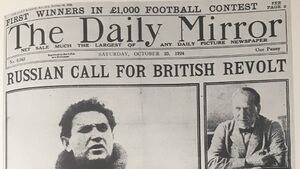 | |
| Date | 1924 |
|---|---|
| Perpetrators | Desmond Morton, George Ball, Winston Churchill? |
| Interest of | Dick Ellis |
| Description | MI5 fake letter published in the Daily Mail to destroy the 1924 Labour government |
The Zinoviev letter was a fake document published by the British Daily Mail newspaper four days before the general election of October 1924. The letter purported to be a directive from Grigory Zinoviev, the head of the Communist International (Comintern) in Moscow, to the Communist Party of Great Britain, ordering it to engage in seditious activities. It said the resumption of diplomatic relations (by a Labour government) would hasten the radicalisation of the British working class. The letter made a strong contribution to Labour Party losing the election.
After the election it was claimed that two of MI5's agents, Sidney Reilly and Arthur Maundy Gregory, had forged the letter. It later became clear that Major George Joseph Ball, a MI5 officer, played an important role in leaking it to the press. In 1927 Ball went to work for the Conservative Central Office where he pioneered the idea of spin-doctoring. Christopher Andrew, MI5's official historian, points out: "Ball's subsequent lack of scruples in using intelligence for party political advantage while at Central Office in the late 1920s strongly suggests... that he was willing to do so during the election campaign of October 1924." [1]
Robin Cook, the Foreign Secretary in the Labour government elected in 1997 commissioned Gill Bennett, chief historian at the Foreign Office, to investigate the case of the Zinoviev Letter. Bennett reported that the letter was forged by a MI6 agent's source and almost certainly leaked by MI6 or MI5 officers to the Conservative Party: "It points the finger at Desmond Morton, an MI6 officer and close friend of Churchill who appointed him personal assistant during the second world war, and at Major Joseph Ball, an MI5 officer who joined Conservative Central Office in 1926."[2]
The case is also interesting to study British intelligence methods, with how dubious claims are picked up and given credibility. Bennett wrote that "though her best guess was that it was commissioned by White Russian intelligence circles from forgers in Berlin or the Baltic states, most likely in Riga. It was then leaked to the papers probably by SIS and that "I have my doubts as to whether [Desmond Morton] thought it was genuine but he treated it as if it was."[3]
MI5 has repeated variants of this method through the years. For example, the historian Michael Jabara Carley pointed out that the "laughable" secret assassin’s manual mentioned by The Daily Mirror "reminds me of the 1924 Zinoviev Letter.[4]
Contents
History
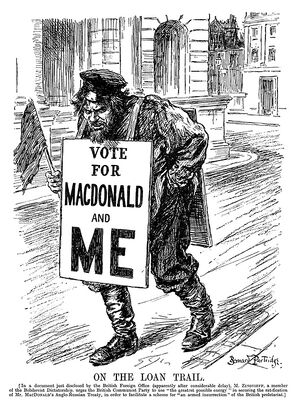
Background
On 22 January 1924, the nominally socialist but practically social-democratic-trade unionist Labour Party formed a UK government for the first time. However, it was a minority government and was liable to fall if the Conservatives and Liberals combined against it. In foreign policy, the government recognised the Soviet Union in February 1924, n return for the promise that Britain would get payment of money that Tsar Nicholas II had borrowed when he had been in power.[5]
The most hostile response to the new Labour government was Lord Northcliffe, the owner of several Conservative Party supporting newspapers. The Daily Mail claimed: "The British Labour Party, as it impudently calls itself, is not British at all. It has no right whatever to its name. By its humble acceptance of the domination of the Sozialistische Arbeiter Internationale's authority at Hamburg in May it has become a mere wing of the Bolshevist and Communist organisation on the Continent. It cannot act or think for itself."[6]
Two days after forming government, Ramsay MacDonald received a note from General Borlass Childs of Special Branch that said "in accordance with custom" a copy was enclosed of his weekly report on revolutionary movements in Britain. MacDonald wrote back that the weekly report would be more useful if it also contained details of the "political activities... of the Fascist movement in this country". Childs wrote back that he had never thought it right to investigate movements which wished to achieve their aims peacefully. In reality, MI5 was already working very closely with the British Fascisti, that had been established in 1923.[7]
On 8 October 1924, the Labour government suffered defeat in the House of Commons on a motion of no confidence; this forced MacDonald to go to King George V to seek a dissolution of Parliament and a new election. The immediate cause of the parliamentary defeat had been the government's decision to drop the prosecution of communist editor John Ross Campbell under the Incitement to Mutiny Act 1797, for publication of an open letter in Workers' Weekly calling on soldiers to "let it be known that, neither in the class war nor in a military war, will you turn your guns on your fellow workers." A general election was scheduled for 29 October.[8].
Letter
Near the end of the short election campaign, there appeared in the Daily Mail newspaper the text of a letter purporting to have originated from Grigory Zinoviev, head of the Executive Committee of the Communist International (Comintern) and Secretary of the Comintern Otto Wille Kuusinen and Arthur MacManus, a British representative at a conference of the Executive Committee, and addressed to the Central Committee of the Communist Party of Great Britain (CPGB).
One particularly damaging section of this letter read:
A settlement of relations between the two countries will assist in the revolutionising of the international and British proletariat not less than a successful rising in any of the working districts of England, as the establishment of close contact between the British and Russian proletariat, the exchange of delegations and workers, etc. will make it possible for us to extend and develop the propaganda of ideas of Leninism in England and the Colonies.[9]
Publication
The damning document was published in the conservative Daily Mail newspaper four days before the election.[10] The letter appeared at a sensitive time in relations between Britain and the Soviet Union, owing to Conservative opposition to the parliamentary ratification of the Anglo-Soviet trade agreement of 8 August.
The publication of the letter was severely embarrassing to Prime Minister MacDonald and his Labour Party.[11] Although his party faced the likelihood of losing office, MacDonald had not given up hope in the campaign. Following the letter's publication, any chance of an upset victory was dashed, as the spectre of internal revolution and a government oblivious to the peril dominated the public consciousness. MacDonald's attempts to cast doubt as to the authenticity of the letter were in vain, hampered by the document's widespread acceptance among government officials. He told his Cabinet that he "felt like a man sewn in a sack and thrown into the sea."
Election result
The Conservatives decisively won the October 1924 election, ending the country's first Labour government. After the Conservatives formed a government with Stanley Baldwin as Prime Minister, a Cabinet committee investigated the letter and concluded that it was genuine.[12] The Conservative government did not undertake any further investigation, despite continuing allegations that the letter was forged.[13] On 21 November 1924, the government cancelled the unratified trade agreement with the Soviet Union.[14]
Denial by Zinoviev
The Comintern and the Soviet government vehemently and consistently denied the authenticity of the document.[15] Grigory Zinoviev issued a denial on 27 October 1924 (two days before the election), which was finally published in the December 1924 issue of The Communist Review, the monthly theoretical magazine of the CPGB, well after the MacDonald government had fallen. Zinoviev declared:
The letter of 15th September, 1924, which has been attributed to me, is from the first to the last word, a forgery. Let us take the heading. The organisation of which I am the president never describes itself officially as the "Executive Committee of the Third Communist International"; the official name is "Executive Committee of the Communist International." Equally incorrect is the signature, "The Chairman of the Presidium." The forger has shown himself to be very stupid in his choice of the date. On the 15th of September, 1924, I was taking a holiday in Kislovodsk, and, therefore, could not have signed any official letter. [...]
It is not difficult to understand why some of the leaders of the Liberal-Conservative bloc had recourse to such methods as the forging of documents. Apparently they seriously thought they would be able, at the last minute before the elections, to create confusion in the ranks of those electors who sincerely sympathise with the Treaty between England and the Soviet Union. It is much more difficult to understand why the English Foreign Office, which is still under the control of the Prime Minister, MacDonald, did not refrain from making use of such a white-guardist forgery.[16]}}
Impact
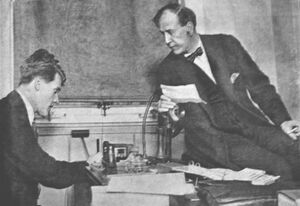
The letter also aided the Conservatives by inducing a collapse in the Liberal vote; this led to a Conservative landslide.
The result of the election was not disastrous to Labour. The Conservatives were returned decisively, gaining 155 seats, making a total of 413 Members of Parliament. Labour lost 40 seats, retaining 151. The Liberals lost 118 seats, leaving them with only 40, and their vote count fell by over a million. The real significance of the election was that the Liberals—whom Labour had displaced as the second-largest political party in 1922—were now clearly a minor party.
The Zinoviev letter hardened attitudes, and hardened them at a time when the Soviet Union was becoming more amenable to diplomatic contact with the capitalist world. The proponents of world revolution were being superseded by theStalinist philosophy of "Building Socialism in One Country". Thus, after successfully weathering all the early contradictions in Soviet Diplomacy, Britain gave up when the going was about to become much easier. And it gave up largely because the two middle-class parties suddenly perceived that their short-term electoral advantage was best served by a violent anti-Bolshevik campaign.[17]
The Letter
Very secret[18]
Executive Committee, Third Communist International.
To the Central Committee, British Communist Party.
Presidium, September 15, 1924. Moscow.
Dear Comrades,
The time is approaching for the Parliament of England to consider the Treaty concluded between the Governments of Great Britain and the S.S.S.R. for the purpose of ratification. The fierce campaign raised by the British bourgeoisie around the question shows that the majority of the same, together with reactionary circles, are against the Treaty for the purpose of breaking off an agreement consolidating the ties between the proletariats of the two countries leading to the restoration of normal relations between England and the S.S.S.R.
The proletariat of Great Britain, which pronounced its weighty word when danger threatened of a break-off of the past negotiations, and compelled the Government of MacDonald to conclude the treaty, must show the greatest possible energy in the further struggle for ratification and against the endeavours of British capitalists to compel Parliament to annul it.
It is indispensable to stir up the masses of the British proletariat to bring into movement the army of unemployed proletarians whose position can be improved only after a loan has been granted to the S.S.S.R. for the restoration of her economics and when business collaboration between the British and Russian proletariats has been put in order. It is imperative that the group in the Labour Party sympathising with the Treaty should bring increased pressure to bear upon the Government and Parliamentary circles in favour of the ratification of the Treaty.
Keep close observation over the leaders of the Labour Party, because these may easily be found in the leading strings of the bourgeoisie. The foreign policy of the Labour Party as it is, already represents an inferior copy of the policy of the Curzon Government. Organize a campaign of disclosure of the foreign policy of MacDonald.
The I.K.K.I. (Executive Committee, Third [Communist] International) will willingly place at your disposal the wide material in its possession regarding the activities of British Imperialism in the Middle and Far East. In the meanwhile, however, strain every nerve in the struggle for the ratification of the Treaty, in favour of a continuation of negotiations regarding the regulation of relations between the S.S.S.R. and England. A settlement of relations between the two countries will assist in the revolutionising of the international and British proletariat not less than a successful rising in any of the working districts of England, as the establishment of close contact between the British and Russian proletariat, the exchange of delegations and workers, etc., will make it possible for us to extend and develop the propaganda of ideas of Leninism in England and the Colonies. Armed warfare must be preceded by a struggle against the inclinations to compromise which are embedded among the majority of British workmen, against the ideas of evolution and peaceful extermination of capitalism. Only then will it be possible to count upon complete success of an armed insurrection. In Ireland and the Colonies the case is different; there there is a national question, and this represents too great a factor for success for us to waste time on a prolonged preparation of the working class.
But even in England, as other countries, where the workers are politically developed, events themselves may more rapidly revolutionise the working masses than propaganda. For instance, a strike movement, repressions by the Government etc.
From your last report it is evident that agitation-propaganda work in the army is weak, in the navy a very little better. Your explanation that the quality of the members attracted justifies the quantity is right in principle, nevertheless it would be desirable to have cells in all the units of the troops, particularly among those quartered in the large centres of the country, and also among factories working on munitions and at military store depots. We request that the most particular attention be paid to these latter.
In the event of danger of war, with the aid of the latter and in contact with the transport workers, it is possible to paralyse all the military preparations of the bourgeoisie, and make a start in turning an imperialist war into a class war. Now more than ever we should be on our guard. Attempts at intervention in China show that world imperialism is still full of vigour and is once more making endeavours to restore its shaken position and cause a new war, which as its final objective is to bring about the break-up of the Russian Proletariat and the suppression of the budding world revolution, and further would lead to the enslavement of the colonial peoples. 'Danger of War', 'The Bourgeoisie seek War', 'Capital fresh Markets' - these are the slogans which you must familiarise the masses with, with which you must go to work into the mass of the proletariat. These slogans will open to you the doors of comprehension of the masses, will help you to capture them and march under the banner of Communism.
The Military Section of the British Communist Party, so far as we are aware, further suffers from a lack of specialists, the future directors of the British Red Army.
It is time you thought of forming such a group, which together with the leaders, might be in the event of an outbreak of active strife, the brain of the military organisation of the party.
Go attentively through the lists of the military 'cells' detailing from them the more energetic and capable men, turn attention to the more talented military specialists who have for one reason or another, left the Service and hold Socialist views. Attract them into the ranks of the Communist Party if they desire honestly to serve the proletariat and desire in the future to direct not the blind mechanical forces in the service of the bourgeoisie, but a national army.
Form a directing operative head of the Military Section.
Do not put this off to a future moment, which may be pregnant with events and catch you unprepared.
Desiring you all success, both in organisation and in your struggle.
With Communist Greetings,
President of the Presidium of the I.K.K.I.
ZINOVIEV
Member of the Presidium: McMANUS
Secretary: KUUSINEN
Wikipedia
The English-language Wikipedia page (January 2021) heavily downplays the official intelligence services part in the smear job.
References
- ↑ Christopher Andrew, The Defence of the Realm: The Authorized History of MI5 (2009) page 150
- ↑ https://www.theguardian.com/politics/1999/feb/04/uk.politicalnews6
- ↑ https://www.theguardian.com/politics/1999/feb/04/uk.politicalnews6
- ↑ http://www.voltairenet.org/article200813.html
- ↑ Zara S. Steiner, The Lights that Failed: European International History, 1919-1933 (2007) page 173
- ↑ The Daily Mail (30th November 1923)
- ↑ John Hope, Lobster Magazine (November, 1991)
- ↑ A.J.P. Taylor, English History: 1914–1945 (1965), pp. 218, 225
- ↑ Thttps://en.wikisource.org/wiki/Zinoviev_Letter
- ↑ Daily Mail, 25 October 1924, p.9
- ↑ Gill Bennett, "'A Most Extraordinary and Mysterious Business': The Zinoviev Letter of 1924," Historians LRD No. 14. London: Foreign and Commonwealth Office, Jan. 1999. Page 1.
- ↑ Charles Loch Mowatt, Britain between the wars:1918–1940, page=193
- ↑ Charles Loch Mowatt, Britain between the wars:1918–1940, page=194
- ↑ https://archive.org/details/britainsovietcol00neil%7Curl-access=limited%7Cfirst=Keith%7Clast=Neilson
- ↑ Bennett, "'A Most Extraordinary and Mysterious Business,'" p. 2.
- ↑ Grigorii Zinoviev, "Declaration of Zinoviev on the Alleged 'Red Plot'", The Communist Review, vol. 5, no. 8 (Dec. 1924), pp. 365–366.
- ↑ Lewis Chester, Steven Fay, and Hugo Young, The Zinoviev Letter: A Political Intrigue. Philadelphia: J.B. Lippincott Co., 1968. Page xvii.
- ↑ https://en.wikisource.org/wiki/Zinoviev_Letter
